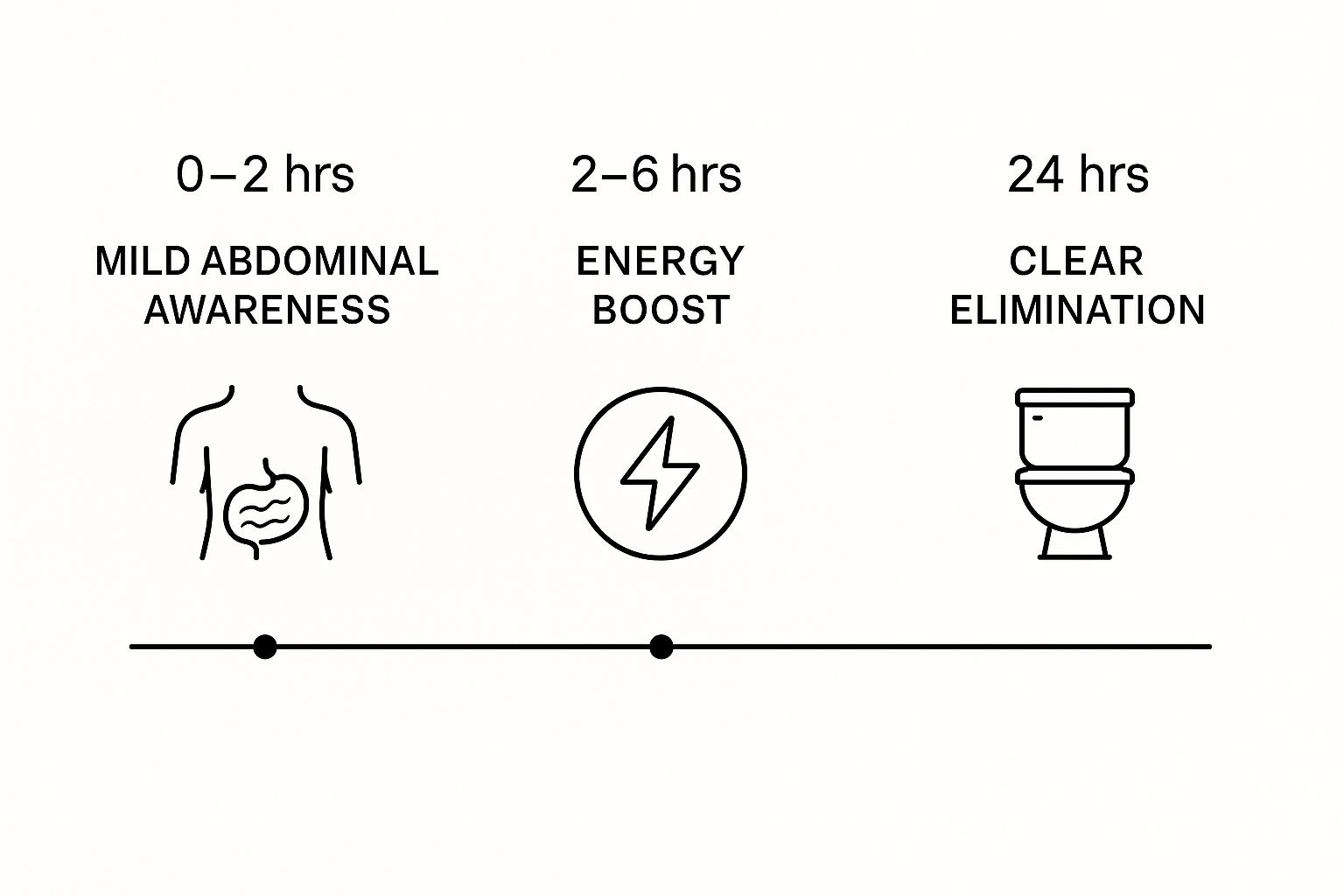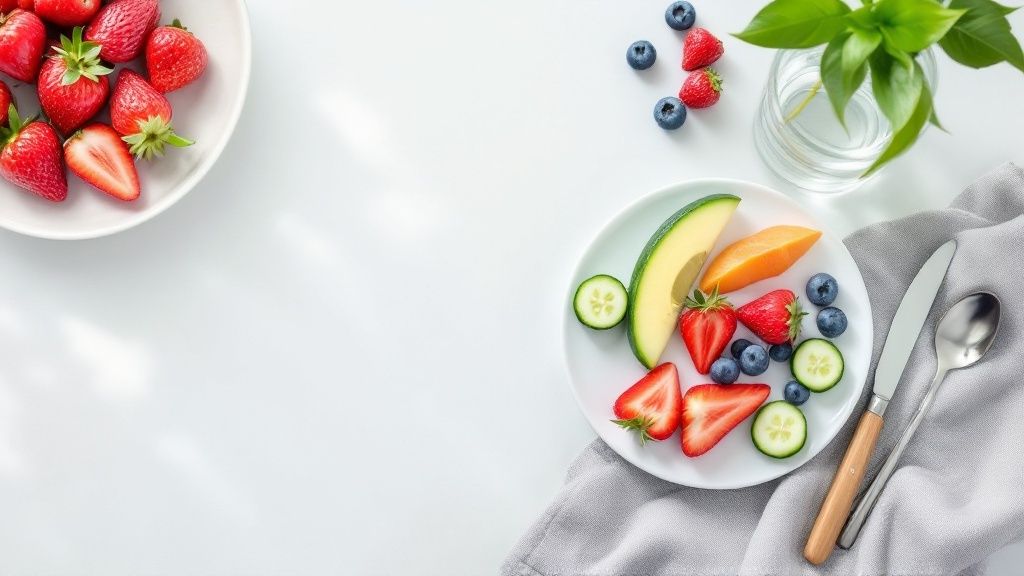So, you’ve just finished your colon hydrotherapy session. The most common feedback I hear from clients is that they feel lighter, cleaner, and maybe a little empty. It's a unique sensation. Many people describe an immediate surge of energy, but it's just as normal to feel a bit tired or notice some mild gurgling in …
So, you’ve just finished your colon hydrotherapy session. The most common feedback I hear from clients is that they feel lighter, cleaner, and maybe a little empty. It's a unique sensation. Many people describe an immediate surge of energy, but it's just as normal to feel a bit tired or notice some mild gurgling in your belly as your system gets back to business.
Your Immediate Post-Treatment Experience
Think of the first 24 hours after your session as a crucial recalibration period for your body. You've essentially hit a gentle reset button on your digestive system, and now it needs a moment to process that change. Your main job during this time is to support its recovery with plenty of rest, hydration, and smart food choices.
Most people walk out of their appointment feeling refreshed and unburdened. However, it's perfectly okay if you feel a little wiped out. Your body has just been through an active cleansing process, and a bit of fatigue is a natural response. This usually doesn't last long and often gives way to a feeling of renewed vitality.
The First Few Hours
For the first hour or two, you might experience some mild, temporary cramping or a "gurgling" sound. This is completely normal! It’s just the sensation of your colon settling back into its natural rhythm after being gently cleansed with warm, filtered water. It's a good sign that your digestive tract is adjusting, kind of like how your muscles feel after a really good stretch.
The First 24 Hours After Colon Hydrotherapy
To give you a clearer picture, here's a simple timeline of what you can generally expect in the day following your treatment.
| Timeframe | Common Sensations | Recommended Actions |
|---|---|---|
| 0-2 Hours | Feeling light, empty, or minor gurgling. | Drink plenty of water. Eat a light, simple meal. Rest. |
| 2-12 Hours | Initial fatigue or a boost of energy. | Continue hydrating. Avoid strenuous exercise. |
| 12-24 Hours | Energy levels may stabilize. Bowel is quiet. | Eat easily digestible foods like soups or steamed veggies. |
Remember, everyone's body is different, so your experience might vary slightly, and that's perfectly fine. This is just a general guide to help you know what to expect.
Energy and Bowel Movements
Don't be alarmed if you don't have a bowel movement for a day or two. This is one of the most common (and normal) outcomes. Since your colon has been thoroughly cleansed, it simply needs some time to refill before it's ready to eliminate again.
The initial hours post-treatment are less about seeing dramatic results and more about giving your body the gentle support it needs to integrate the cleanse. Hydration and rest are your two best friends during this phase.
By the way, how you feel after your session can also be influenced by what you did before. Proper preparation can make a world of difference. To learn more, take a look at our guide on what to do before a colonic hydrotherapy session.
This visual gives a great overview of the key recovery stages you'll move through in that first day.

As you can see, the process starts with a gentle adjustment period, which is often followed by a noticeable increase in energy before your digestive system gets back into a regular rhythm.
Navigating Common Physical and Emotional Reactions

While many people walk out of a session feeling light and energized, it's just as normal to experience a whole spectrum of other responses. Your body just went through a significant cleansing process, and it’s going to need a little time to adjust. Knowing what to expect makes navigating this post-treatment period a much smoother experience.
I like to compare it to spring cleaning a cluttered room. While you're in the middle of it, things can look a bit messy and chaotic before everything settles into its new, organized place. Your digestive system is doing something similar—reorganizing itself from the inside out, which can stir up some temporary, and totally normal, side effects.
Common Physical Adjustments
One of the most common things I hear from clients is that they feel tired or even a bit wiped out afterward. This isn't a bad sign! On the contrary, it means your body is smartly diverting its energy toward healing and recalibrating itself. This fatigue usually lifts within 24 hours, and what often follows is a welcome surge of vitality.
You might also notice some temporary changes in your digestion. It’s not unusual to have some mild bloating or gas as the good bacteria in your gut find a new balance. These feelings are almost always short-lived, resolving on their own as your system settles down.
It’s best to think of these reactions not as side effects, but as signs of progress. They’re simply signals that your body is responding to the cleanse and actively working to heal.
If the bloating feels particularly uncomfortable, there are some gentle ways to ease it. For some extra support, you can check out our guide on how to relieve bloating. Understanding this phase is a key part of knowing what to expect after colon hydrotherapy.
The Emotional Side of Cleansing
The gut-brain connection is incredibly powerful, so it should come as no surprise that a physical cleanse can sometimes trigger an emotional one. I've had clients report feeling unusually sensitive, weepy, or even a little irritable for a day or two after their session.
This is often referred to as an emotional release. As your body clears out physical waste and accumulated toxins, it can also let go of old, stagnant emotional energy that was stuck right along with it.
Here are a few emotional responses you might notice:
- Heightened Sensitivity: You could feel more emotionally raw or vulnerable than you typically do.
- A Sense of Relief: Many people feel a weight lifted, releasing old stress or tension they didn't even know they were carrying.
- Temporary Mood Swings: A brief bout of irritability or sadness can pop up as your system recalibrates.
These feelings, while less talked about, are a completely normal part of the process. The best thing you can do is give yourself the space to feel whatever comes up without judging it. Be gentle with yourself, get some rest, and trust that this is a temporary—and often deeply therapeutic—part of your healing journey.
Understanding the Risks and Realities
Before we get into what to expect after a session, let's take a clear-eyed look at the procedure itself. Many people rave about their experiences, but a truly informed decision means going beyond personal stories to understand the potential risks and what the wider medical community thinks.
This isn't meant to scare you off, but to give you the full picture. A colonic is an invasive procedure, and just like any medical or wellness treatment that involves going inside the body, it has risks. Knowing what they are helps you choose a great practitioner and spot any warning signs if they pop up.
A Look at Potential Complications
The vast majority of colon hydrotherapy sessions go smoothly. Still, it’s smart to know what could happen. The procedure introduces a lot of fluid into your colon, and that can sometimes throw your body's delicate internal systems out of whack.
One of the main concerns is a potential electrolyte imbalance. Your body needs a precise mix of minerals like sodium and potassium to run everything from your muscles to your heart. Flushing the colon with large amounts of water can dilute these essential minerals. This might lead to dizziness or muscle cramps, and in very rare, serious cases, bigger health problems. It's exactly why hydrating with electrolyte-rich drinks afterward is so crucial.
Another risk is infection. This is much less common today with modern equipment, but it’s still a possibility. If the tools aren't perfectly sterilized, harmful bacteria could be introduced into your system. This really drives home how important it is to pick a certified, reputable center that takes hygiene seriously.
Serious but Rare Events
It's important to mention that more severe complications have been recorded, though they are extremely rare. The most serious is bowel perforation, which is a tear in the colon wall. This is a medical emergency requiring immediate surgery. The risk is higher for people with pre-existing conditions like diverticulitis or Crohn's disease, which is why a thorough health screening with your practitioner beforehand is non-negotiable.
While most practitioners are dedicated professionals, the medical community remains skeptical about colon hydrotherapy because there's a lack of strong scientific proof for its claimed "detox" benefits.
This skepticism comes from a disconnect between anecdotal wellness claims and what has been proven in clinical studies. Medical reviews have consistently found no solid, controlled trials that show colon cleansing improves general health. On the flip side, there are documented cases of adverse effects, from the more common electrolyte issues to the rare but devastating outcomes like perforation or even death. You can dig into some of these findings to learn more about the medical perspective on colon cleansing.
Ultimately, you have to weigh the potential risks against the benefits people report. Having this honest conversation ensures you’re going in with your eyes wide open, ready to have a safe experience and a clear understanding of what to expect afterward.
Your Post-Colonic Diet and Hydration Plan

What you do after your colonic is just as critical as the session itself. Think of it this way: your digestive system is like a freshly tilled garden. Now is the time to sow the right seeds and provide the best nourishment to help everything flourish. A smart post-colonic plan will soothe your system, restore essential nutrients, and encourage a healthy, balanced gut.
Hydration is your number one job. A colonic uses a lot of water, so it's essential to replenish your body's fluids and electrolytes to feel your best. Make a point to sip on pure, filtered water consistently throughout the day.
Beyond water, other drinks can help restore your mineral balance without putting any strain on your system. Soothing herbal teas like peppermint or chamomile are fantastic choices. Unsweetened coconut water is another great option, as it’s a natural source of electrolytes that helps you rehydrate quickly and effectively.
Gentle Foods for a Happy Gut
For at least the first 24 hours, you want to be incredibly kind to your digestive system. It’s just had a thorough cleanse and needs gentle care, not a heavy workload. Tossing in hard-to-digest foods right now can cause bloating and discomfort, completely erasing that light, clean feeling you’re enjoying.
The goal is simplicity. Focus on whole foods that are cooked, soft, and easy to break down. This allows your body to absorb all the good stuff without working overtime.
Some of the best things to reach for include:
- Steamed Vegetables: Think carrots, zucchini, and spinach. They’re packed with nutrients and super gentle on the gut.
- Clear Broths: A warm cup of bone broth or a simple vegetable broth is incredibly soothing and hydrating.
- Lean Proteins: Small servings of poached chicken or baked fish provide the amino acids your body needs for recovery.
- Soft Fruits: Bananas, avocados, and simple applesauce give you a natural energy boost and are a breeze to digest.
After your colonic, what you don't eat is just as important as what you do. The following table breaks down some of the best foods to embrace and which ones to skip for a few days to give your system the best chance to reset.
| Foods to Eat vs Foods to Avoid After a Colonic |
| :— | :— |
| Foods to Eat (Supportive & Gentle) | Foods to Avoid (Irritating & Hard to Digest) |
| Steamed or lightly cooked vegetables (spinach, carrots, beets) | Raw vegetables and cruciferous veggies (broccoli, cauliflower) |
| Clear soups and bone broth | Creamy, heavy soups and dairy products |
| Lean proteins like baked fish or poached chicken | Red meat, fried foods, and processed meats |
| Soft, ripe fruits like bananas, melon, and avocado | High-sugar fruits, dried fruits, and citrus |
| Plain, unsweetened yogurt or kefir (after 24 hours) | Sugary snacks, pastries, and desserts |
| Herbal teas (peppermint, ginger, chamomile) | Alcohol, coffee, and sugary sodas |
| Simple grains like white rice or quinoa | Whole wheat bread, beans, and legumes |
Choosing foods from the "eat" column helps ensure your recovery is smooth and comfortable, setting the stage for long-term digestive wellness.
Rebuilding Your Microbiome
A huge part of post-colonic care is supporting your gut flora. While the main goal of the treatment is to clear out old waste, it can also shift the balance of your friendly gut bacteria. The good news is that you can actively help repopulate your gut with the good guys by focusing on probiotic and prebiotic foods.
Probiotics are the beneficial bacteria themselves. You can find them in fermented foods like plain yogurt, kefir, and sauerkraut. Prebiotics, on the other hand, are a type of fiber that acts as food for these good bacteria. Bananas, asparagus, and garlic are all great sources.
By waiting a day or two and then slowly adding these foods back into your diet, you give your internal ecosystem the fuel it needs to thrive. This simple step is key to achieving lasting digestive health.
Potential Long-Term Changes and Benefits

Once you're past the first day or two, your focus will naturally shift from the immediate after-effects to the more lasting impact of the treatment. Everyone's body is different, but many people tell me they experience positive changes that stick around long after that initial "clean and light" feeling fades.
It's useful to think about these benefits in two distinct categories: the general wellness improvements people feel, and the more measurable results seen in medical settings.
For instance, it’s quite common for clients to report a sustained boost in their energy levels for days, sometimes even weeks, following a session. Another thing I hear all the time is feedback about clearer, more vibrant skin. This makes a lot of sense—when your colon is working efficiently as the primary exit route for waste, your body doesn't have to rely as heavily on your skin to push out toxins. The result can often be a brighter, healthier-looking complexion.
From Wellness to Medical Application
Beyond these wellness reports, colon hydrotherapy has a solid, established role in conventional medicine. Its most common use is preparing the bowel for a colonoscopy, and this clinical application gives us a fantastic, measurable window into just how effective the procedure is.
A 2023 analysis, for example, revealed that patients who used hydrotherapy for their bowel prep had a success rate of nearly 80%. What's even more telling is that adverse effects showed up in only 36.4% of those patients. Compare that to the group using standard oral solutions, where a staggering 88.9% reported negative side effects. These numbers really underscore the potential for a much better-tolerated and gentler experience in a medical context. You can dig into the specifics and learn more about its findings on hydrotherapy for bowel preparation in the full study.
This medical use really validates the procedure's core purpose. When we see how effectively and gently it can cleanse the colon for a medical exam, it lends a lot of credibility to the idea that it can help set the stage for better digestive function overall.
Improving Digestive Regularity
Of course, the benefit most people are hoping for is better digestive regularity. For those who struggle with constipation or just feel sluggish, a series of treatments can often help "retrain" the colon. By clearing out old, impacted waste and thoroughly hydrating the bowel, the therapy can encourage the return of more natural, consistent muscle contractions—the wave-like movements called peristalsis.
Think of it less as a one-and-done fix and more as a powerful tool within a larger strategy for your digestive health. The key to achieving this kind of long-term improvement is consistency and proper scheduling. For a deeper dive into finding the right rhythm for your body, our guide on how often you should get colon hydrotherapy is a great resource.
By looking at both the wellness feedback from clients and the hard data from its clinical uses, you can get a really well-rounded picture of what to expect in the long run.
When It's Time to Call a Doctor
Look, your safety comes first, always. Most people feel just fine after a colonic, with maybe a few minor, temporary sensations. But you absolutely need to know the difference between a normal bodily response and a genuine red flag that requires a doctor's attention.
Think about it like this: some mild cramping is like your muscles being a little tired after a good workout—it's expected. But sharp, stabbing pain that doesn't let up? That’s your body sending out an SOS. Knowing these warning signs isn't about being paranoid; it's about being smart and taking care of yourself. If something feels genuinely wrong, don't second-guess it. Get it checked out.
Your body knows what it's doing, and it's pretty good at telling you when something is amiss. Learning to listen is a huge part of the post-colonic experience.
Don't Ignore These Urgent Warning Signs
Serious complications from colon hydrotherapy are very rare, but they aren't impossible. If you experience any of the symptoms below, you need to call your doctor or head to an urgent care clinic right away. Don't just wait and hope they go away on their own.
These aren't your typical post-session side effects. They could point to something more serious, like an infection or, in extremely rare cases, a bowel perforation.
Your well-being is far more important than trying to "tough it out." Acting quickly when you see serious symptoms is the only responsible thing to do. A proper medical evaluation is the only way to be sure everything is okay.
Be on high alert for these red flags:
- Severe or Unrelenting Abdominal Pain: This is a whole different beast from the mild, temporary cramping we talked about. We’re talking sharp, constant pain that might even get worse.
- Fever or Chills: A fever is a classic sign that your body is fighting an infection, and it needs to be taken seriously.
- Rectal Bleeding: Any bleeding after a session—no matter how small—is not normal and needs to be checked out by a doctor.
- Persistent Nausea or Vomiting: If you can't even keep water down, you're on a fast track to dehydration. This requires immediate medical help.
Ignoring these signals is a gamble you don't want to take with your health. The best thing you can do for yourself is to be informed and proactive.
Got Questions? We've Got Answers
It's natural to have questions after a colonic. Understanding what to expect can make the whole process feel much more comfortable and reassuring. Let's tackle some of the most common ones we hear from clients.
How Long Until I Have a Normal Bowel Movement?
Don't be surprised if you don't have a bowel movement for a day or two, sometimes even up to three days, after your session. This is perfectly normal. We've just given your colon a thorough cleanse, so it needs a little time to process new food and build up waste again.
What About Exercise After My Session?
It's a good idea to take it easy for at least the first 24 hours. Think of it as a rest day for your body. While a gentle walk is fine, you'll want to skip any intense workouts. Your body is busy recalibrating and rehydrating.
Your body knows best. Giving it a chance to rest is crucial for absorbing all the benefits of the treatment.
Should I Start Taking Probiotics Immediately?
While getting good bacteria back into your gut is important, jumping straight into probiotics might not be the best move. Your gut environment has just had a major reset. It's always a good idea to chat with your healthcare provider first. They can help you figure out the right type of probiotics and the best time to start taking them for your specific needs.
Ready to feel refreshed and support your body’s natural cleansing power? At Healing Waters Wellness Center, we create a personalized colon hydrotherapy experience just for you. Book your appointment today and start your journey toward renewed well-being.






